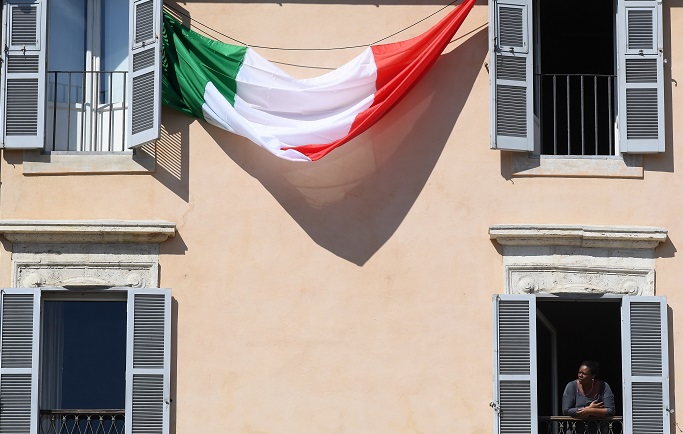Italy marks unusual Liberation Day amid lockdown
Published : 25 Apr 2020, 19:56
In times of the coronavirus pandemic, Italy on Saturday marked the most unusual 75th Liberation Day.
Trying to keep alive the symbolic value of the day --which commemorates the end of Nazi-German occupation in World War II, and the victory of partisan resistance over Italian fascist regime -- Italians had to resort to virtual celebrations amid the lockdown.
With no gathering and no public ceremony allowed for safety reasons, the squares of Rome and Milan remained empty and silent, and the same occurred in all other cities across the country.
Yet, the tough restrictions imposed on people's movements, and the fresh wounds left by the pandemic -- which has so far claimed over 25,900 lives in Italy -- appeared to trigger a renewed will to mark the day in large part of the Italian society.
Locked up in their homes, families were invited to ensure their participation in other ways, such as showing banners from balconies and playing and singing all together from windows.
The call for this main initiative -- under the hashtag "#bellaciaoinognicasa" (Bella Ciao in every home, in Italian) -- came from the National Association of Italian Partisans (ANPI).
At 3 p.m. local time, the song "Bella Ciao" -- the popular anthem of the ANPI, and a traditional lyric accompanying April 25 rallies -- resounded above the streets in many Italian cities.
Most national TV and radio channels and newspapers on their websites followed the moment and broadcast it live, to boost a feeling of common celebration beyond the physical distance.
"Now more than ever, we need hope, unity, and roots, which may give us the strength and perseverance necessary to look forward to a new dawn of Liberation," the ANPI wrote in a statement.
"ANPI calls on the whole country to celebrate it (April 25) as a source of rebirth, of a healthy and robust rebirth," it said.
The call was endorsed by a large array of cultural, social, and political groups, including the country's three main unions CGIL, CISL, UIL, plus university and high school students' networks, various municipalities, major anti-mafia group Libera, and two journalists associations.
Small ceremonies -- restricted to a few officials who kept distant from each other -- were still allowed by the Interior Ministry before key monuments symbolizing the Italian partisans' struggle alongside the Allies against German Nazi and Italian Fascists.
Yet, more than anything else, one photo would tell about the strangeness of this Liberation Day amid the pandemic.
It depicted Italian president Sergio Mattarella, wearing a face mask, descending the Unknown Soldier memorial in the Italian capital after paying a silent tribute. No other officials alongside him, and no crowd at the foot of the memorial, as it would have been every other year.
In his traditional address marking the Liberation Day, Mattarella recalled that Italy -- to exit fascism and World War II -- has "overcome obstacles that appeared insuperable thanks to tenacity, self-sacrifice, and a sense of belonging to a national community."


